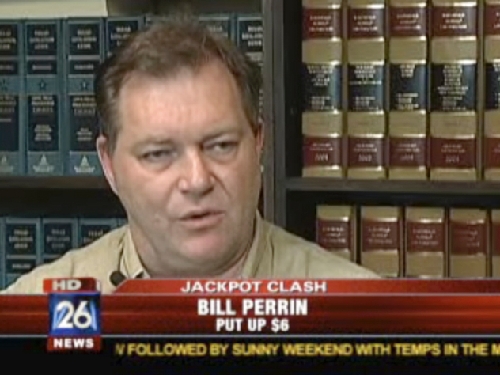Legal dispute over jackpot hinges on sticky note deal


Houston co-workers William Perrin and Diana Walker routinely bought Texas Lottery tickets together, understanding that they would share any winnings.
So in that spirit Perrin gave Walker $6 to gamble on a Megabucks slot machine during her stay at the Aria in Las Vegas last January.
He printed out an article describing Megabucks, a network that links slot machines in casinos statewide to amass multimillion-dollar jackpots.
He told Walker she had to play the $1 machine’s maximum wager, $3, to qualify for a big jackpot. He gave her the money and put a sticky note on the article, “memorializing” their agreement to split any winnings.
Walker, according to plan, gambled $6 on Megabucks at Aria on Jan. 21, winning more than $12.7 million.
That’s where the plan fell apart. She told Perrin she lost his $6, striking it rich only with her own money.
Those facts were spelled out in a lawsuit filed in February in the Harris County District Court in Texas, where Perrin has gone to collect what he considers his rightful share of half the jackpot.
The case is set for trial next January, but a settlement conference is planned later this month. Attorneys for Perrin declined comment, while Walker’s lawyer could not be reached.
In court papers, Perrin’s lawyers argue that under Texas law, Perrin and Walker formed a partnership by simply agreeing to split any winnings. That makes the sticky note a contract, they claim.
Perrin himself also declined comment but earlier this year he told a Dallas-Fort Worth television station that Walker had no idea how to play Megabucks until he explained the game to her.
One of Perrin’s attorneys told the station that Walker admitted under oath that Perrin’s $6 turned into $15 in credits, and that she kept playing until she hit the jackpot.
“It kind of blows my mind where she goes down this path with my winnings,” Perrin told the television station.
“(She) wins the major pot and then says, ‘Oh no, that’s not yours.’ ”
Walker could not be reached for comment. After collecting her jackpot, she dropped out of sight.
Legal disputes over jackpots aren’t uncommon in Las Vegas, though they usually don’t hinge on a sticky note.
The most prominent lawsuit to date concerning gambling winnings came in 2006 when World Series of Poker Main Event champion Jamie Gold was sued in Las Vegas federal court by Los Angeles television producer Bruce Crispin Leyser for half of the $12 million first prize money.
Gold reportedly promised Leyser half his proceeds from the World Series of Poker for helping his sponsor, online gambling company Bodog, line up celebrity players who would wear the website’s logo. The case was settled out of court.
Neither Aria nor International Game Technology, which operates the Megabucks slot machines, are named in the lawsuit. An IGT representative said the company had no comment on the case.
But on Jan. 21, IGT distributed a statement announcing Walker’s Megabucks win, saying that a winner who chose to remain anonymous was visiting Las Vegas to celebrate her niece’s birthday and played the Megabucks machine by chance.
“I was on my way to my room when I saw this machine and decided to play,” the player was quoted in the statement from IGT. She told IGT she thought the slot machine had malfunctioned after lining up the Megabucks symbols, but her niece realized that she had won $12,769,933.
She told IGT she planned on “paying off her mortgage” with the winnings.
IGT would not say whether the winner took the jackpot in a single payment or through annual installments over 20 years.
A spokesman for MGM Resorts International, which owns Aria, also declined comment on the lawsuit. MGM Resorts properties pay a rental fee to IGT for each Megabucks slot machine. From those fees, the jackpots are paid.
Gaming Control Board Chairman Mark Lipparelli said he was unaware of the lawsuit but doubts the state regulatory agency would get involved.
“It sounds like a dispute between two private parties,” Lipparelli said.
Contact reporter Howard Stutz at hstutz@reviewjournal.com or 702-477-3871. Follow @howardstutz on Twitter.












